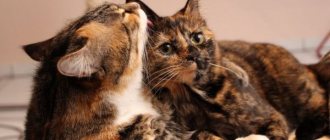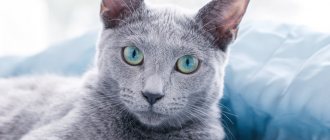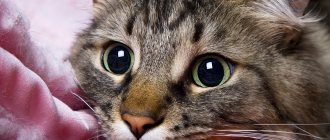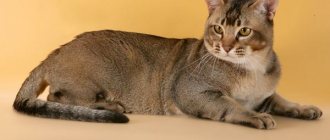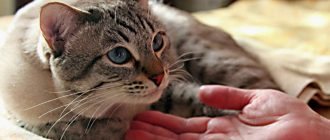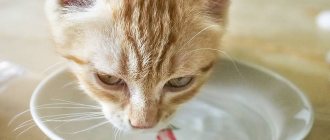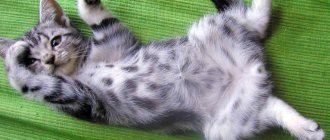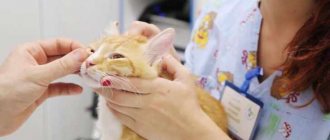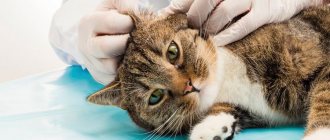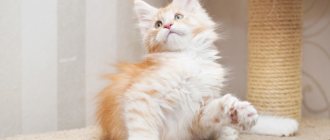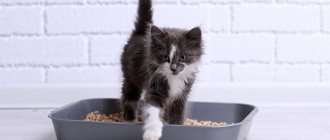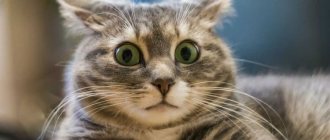How to determine obesity
To determine your pet's weight, you first need to weigh it. This can be done on ordinary human scales, first weighing yourself, and then picking up the animal in your arms. The normal weight of a cat depends on the breed standard, body build, age and gender. The situation is a little different with outbred animals, for which such standards do not exist, because they have a lot of blood mixed in them, which means that in appearance they can be radically different from each other. In this case, an external examination of the cat should help.
In an animal of normal weight, ribs, pelvic bones, and protruding vertebrae should not be visible, but they should be easily palpable. The body is proportional. There is a little fat on the stomach, the waist is visible.
In an overweight cat, the waist is barely visible, the ribs and spine are barely palpable, and a fairly large layer of fat is palpable on the chest and abdomen.
In an obese animal, the ribs and spine are practically not palpable due to fat, there is a very large round belly that sticks out from the sides when walking, a large layer of fat is palpable on the stomach and chest. An obese cat has difficulty walking. He becomes inactive and shortness of breath appears. Let's look at how to lose weight for an overweight cat below.
Why does a cat need grass?
An indispensable ingredient in the diet of a cat that is losing weight is green grass. This is a natural food that has a positive effect on the functioning of the digestive system. The grass contains zinc, manganese, pantothenic acid and vitamins of various groups, which are necessary to rid the body of parasites and strengthen the immune system.
Constantly monitoring the weight and whether the cat is losing weight or getting fat is the right decision. This is an indicator of the development of the body, the appearance of symptoms of diseases and other problems. A well-formulated diet will help protect an adult cat and keep a kitten safe.
Fattening a cat if it is losing weight is deliberately dangerous. A fat and fluffy animal looks cute and even adorable, but for the animal it is an extra burden, decreased activity and the risk of various diseases that occur in a passive form and may not be noticeable at the initial stage.
The basis of the meat diet is lean beef, cut into small pieces. Next you need to provide the dish with vitamins. This can be done using vegetables or special additives . Veterinary stores sell vitamin powders that contain everything your pet needs. The compositions are not cheap, but it saves the housewife time.
Almost a year ago we decided to neuter our cat. He constantly marked his apartment and nothing helped wean him from this bad habit. I have always believed that after castration, cats begin to actively gain weight. A striking example of this is the neighbor’s cat, which probably already weighs about nine kilograms. Ours, not only does not get better, but, on the contrary, loses weight. Is this normal? How should a cat's body react to such an operation? Should he see a vet if he is otherwise doing well?
After castration, many cats begin to actively gain weight, since against the background of female sex hormones they experience passivity, a decrease in physical activity and the rate of metabolic processes. If your cat is alert, active, and has a good appetite, then the animal is healthy. How long ago have you been treated for worms? Pronounced weight loss in animals can be observed with diabetes mellitus, but at the same time cats experience increased thirst and polyuria at night. I think everything is fine with your cat.
My cat was neutered two months ago. During this time, he did not lose weight, but he did not gain much weight either. It all depends on how often and in what quantities you feed him. Naturally, after the loss of one of the important functions of the body, the previous need is sublimated by something else, as a rule, food. My cat started asking for food much more often. The three of us live in an apartment, so the cat asks everyone for food as soon as the person comes home. In this case, only the stomach grows; the rest of the body does not increase in size. I think that castration is still stress for the body, and any stress leads to changes in metabolic processes in the body, which can also lead to temporary weight loss.
If you notice that your cat is losing weight immediately after castration, this may be due to infection or some kind of virus. It would be better to see a veterinarian. This operation is usually fairly painless for cats, so this reaction should not occur. If some time has passed after, then there may be many reasons. It’s never a bad idea to check with a veterinarian if you suspect something is wrong.
Almost a year ago we decided to neuter our cat. He constantly marked his apartment and nothing helped wean him from this bad habit. I have always believed that after castration, cats begin to actively gain weight. A striking example of this is the neighbor’s cat, which probably already weighs about nine kilograms. Ours, not only does not get better, but, on the contrary, loses weight. Is this normal? How should a cat's body react to such an operation? Should he see a vet if he is otherwise doing well?
When an animal is eating consistently but not gaining weight, pet owners sound the alarm. Many people believe that if a cat eats, then weight gain is a natural process. This is not entirely true. Animals, like people, are active and dynamic, which burns extra calories and helps the pet lose weight. When a cat loses weight but eats well, this is normal. With active life, weight loss is ensured by normal metabolism. The situation is different with sedentary cats.
We recommend reading: Diseases of Budgerigars Treatment
Don't expect your kitten to actively gain fat. During the first 9-11 months, kittens develop their skeleton and posture, and the baby gets fat and loses weight. Young cats and female cats become soft and plump 1-2 years after birth.
Obesity in sterilized cats
Sterilization of a cat is accompanied by serious hormonal changes in the body. Appetite increases, metabolism slows down, and activity decreases. The cat eats a lot and moves little, which is why it gradually develops obesity.
How can a cat lose weight in this case? After sterilization, it is important to monitor the amount of food the animal consumes. Out of pity, you should not give your cat as much food as she can eat. Feed should be given in the quantity indicated on the manufacturer’s packaging, in accordance with the age and weight of the animal. Gorging after surgery in a cat can last about two months.
Neutered cats often suffer from obesity. After the operation, they become lazy and inactive, the amount of food consumed does not decrease, and therefore problems with excess weight appear. We’ll look at how to lose weight for a neutered cat below.
What is the optimal weight for an adult cat?
Depending on the breed, the pet’s weight varies from 3 to 7 kg. Mature animals are usually fit and lean, especially if it is a male, who is losing weight and gaining weight constantly. The lifestyle of a healthy cat is active and dynamic. After “playing”, the pet wants to drink a lot, the animal eats abundantly, which has a positive effect on the digestive processes.
We recommend reading: Are Helminths Transmitted to People from Cats?
Dangerous symptoms of weight loss include:
- Lethargy, apathy . Sudden mood changes are evidence of anxiety. The cat feels bad and cannot find a place for itself, does not play and refuses food.
- Blood, frequent diarrhea . If the cat has lost weight and foreign inclusions are observed in the urine and diarrhea, you need to go to the clinic and have tests done.
- Bloating . Do not confuse high weight with a bloated stomach. The cat may become worse and worse due to internal swelling, infection, infection, which is why he does not eat.
Decreased activity
Physical inactivity is a decrease in the activity of the animal. It can be caused by various factors: sterilization, age, disease. Often cats who do not have access to the outside suffer from this. Street animals are constantly on the move: they hunt, look for food, fight with each other, and look for a partner to mate with. Domestic cats are deprived of all these joys. Their world is limited by the walls of the apartment, food is given to them by humans, and sterilized animals do not even think about reproduction. The only joy for them is to eat deliciously. Young animals can be active: rush around the apartment, play, jump on walls, but with age they become more and more lazy. As a result, indoor cats that do not go outside are more likely to become obese.
Diseases that cause obesity
Some diseases of internal organs can cause excess weight in a cat. Obesity can be caused by problems with the stomach, intestines, liver, and gall bladder. Cats with diabetes often suffer from excess weight. Due to a lack of insulin, glucose metabolism is disrupted, which leads to obesity.
Another reason is hormonal imbalances resulting from problems in the thyroid gland. Due to excessive release of hormones or lack of them, the animal becomes less active and eats more.
Another reason is genetic predisposition. It has been noted that the offspring of overweight cats also have this problem. Can a cat lose weight in this case? If there is a genetic predisposition, it is important to constantly monitor the animal and its diet. If the situation is not controlled, the cat will quickly gain weight again. Such animals are prescribed a lifelong diet, and it is better to give them special food.
Problems with the nervous system, bones and muscles are the cause of decreased cat activity. In this case, you need to reduce the amount of animal feed.
Why is a cat losing weight?
Pathology
If a cat eats a lot of food, but loses weight, there are several reasons:
- Presence of parasites . Worms or helminths can destroy a pet’s body from the inside. Even though the cat eats a lot of food, he continues to lose weight. A cat can become infected with helminths through dirty shoes, unwashed hands, or a dirty litter tray. You can get rid of parasites only by using special medications (treatment is carried out for at least six months).
- Diseases of internal organs. In diseases, there are two mechanisms for losing weight: lack of appetite and small doses of food consumed; and the process of digestion and absorption of food is disrupted. Endocrine diseases and pathologies of the digestive system lead to weight loss even when eating enough food. Associated symptoms are apathy, hair loss, diarrhea or constipation, etc.
- Stress. If an animal is stressed for a long time, it may lose weight even with a good appetite. If a cat is depressed, there may be no appetite at all, which also affects weight. Well, you need to wait for the cat to return to normal; neurological disorders require treatment and sedative medications.
- Infections. Infectious diseases are always accompanied by weight loss. All because the pet refuses food and water. The most common diseases are calcivirosis, rhinotracheitis, viral peritonitis, and panleukopenia. Often these diseases lead to the death of the pet.
- Tumors. Any malignant neoplasms can cause exhaustion in a cat. The animal has no appetite, hair falls out, and vomiting and diarrhea are possible.
- Allergy. If there is an allergic reaction, the cat may lose its sense of smell, making it difficult for it to perceive food. She will eat less and lose weight.
We recommend reading: Why does a cat purr loudly and open its mouth
? Don’t forget about vaccinations. Most people believe that if an animal lives in a house, it cannot get sick. We can bring various viruses and infections with clothes or shoes, and cats living at home are more susceptible to them than street cats.
Physiological reasons
The conditions in which the animal is kept also matters. Here the reasons for weight loss can be:
- Mating period. During this time, pets may forget about food and lose body weight. At the end of the period of “festivities” the animal returns to normal. Changes in temperature. In winter, the cat accumulates fat; in summer, the fat is absorbed.
- Pregnancy . During pregnancy, a cat's appetite is always good, but as soon as she starts feeding kittens, she may lose weight. Everything will fall into place as soon as the feeding period is over.
- Feed. A cat's weight directly depends on the quality of food consumed. You cannot suddenly change her diet from dry food to homemade food. Due to menu changes, the pet always loses weight.
Most owners do not check the weight standards for their pet, taking into account its age and breed.
Other digestive and body problems
It is worth noting that not only obesity can pose a danger to the animal. If a cat has lost a lot of weight, this means that he has serious health problems. It is worth paying attention to this, because exhaustion, like obesity, can be fatal.
If the cat does not eat anything and has lost weight, other symptoms of the disease should be noted. Perhaps the new food is simply not suitable for the animal. It is worth remembering that it is necessary to change food gradually, slowly increasing the amount of new and decreasing the amount of old. In addition, there is a possibility that the new food is simply not suitable for your pet. In this case, it should be replaced with another one.
If your cat's hind legs have lost weight, this may indicate kidney failure. In this case, you need to urgently consult a doctor. If a cat vomits and has lost weight, the following are possible: poisoning, infectious diseases, serious problems with the liver, kidneys, and gastrointestinal tract. Only a doctor can make an accurate diagnosis after examination. It is worth noting that if by summer the cat sheds a lot and has lost weight, there is no need to worry. The warm fur coat falls off, and the fat layer decreases, so the body does not overheat from high summer temperatures.
Physiological reasons for a cat losing weight
The condition of the animal is influenced by many factors, for example, living conditions, hormonal changes, character, changes in the cat’s life and others:
- Spring is the period when a cat needs to go for a walk, so food is often the last thing the animal thinks about. Its mass decreases at this time, but when all its needs are satisfied, it begins to recover.
- Changes in temperature: for example, before winter, mammals gain fat, losing it in warmer times.
- Any surprises in everyday life cause trauma to the animal. For example, having a child, moving, a new pet.
- A pregnant or postpartum cat usually has an excellent appetite as she feeds her babies. If there are too many kittens, the mother will lose weight, but after the end of the feeding period her weight will return to normal.
- Some breeds (Siamese, Abyssinians, Sphynxes, Bengals and others) have an excellent appetite, which does not affect their figure.
- The cat is sensitive to food, so changing food may not suit her at first, so she will experience a weight loss in the first week.
We recommend reading: Classic Ringworm in Dogs
If your cat is healthy but losing weight, don’t worry if he has:
- A specific breed - Somali, Abyssinian, Bengal.
- Active, mobile lifestyle.
- Age over ten years.
- Changes in life (moving to a new home, change of owners, new litter box)
If the pet is calm, but the weight loss is too sudden, then the following symptoms will be a sign of the disease:
- Changing your lifestyle from active to sluggish and apathetic.
- Drowsiness.
- The appearance of an unpleasant odor.
- Loss of tufts of fur, matting in tangles.
- Blood in excrement.
- Diarrhea, nausea or constipation.
- Pallor of the mucous membranes.
- Temperature increase.
Poor nutrition
One of the main causes of obesity in cats is poor nutrition. Many owners are not aware of the proper nutrition of cats; they keep animals in accordance with established traditions (feed from the table) or buy advertised inexpensive food for the animal, which is often of extremely poor quality.
It is worth understanding that a cat is not a person, which means it cannot eat everything that people eat. Soups, borscht, boiled potatoes - all this is strictly contraindicated to give to an animal. Large chicken bones are downright deadly, as there are often cases where sharp pieces of bone have ripped open a cat’s throat. Chocolate is poisonous for cats.
Cheap economy-class food, which is sold in almost all stores, does not provide any benefit to the cat and can cause serious illnesses. The point is the low-quality components that are often included in the food. In addition, such food contains chemical impurities. Economy class food contains an additive that is addictive in cats. The animal pounces on food not because it is hungry, but because of the influence of a kind of drug on it.
Consequences of obesity
Obesity causes increased stress on the skeleton and internal organs of the animal, which causes the body to wear out faster. Due to pain in the joints and bones, the animal moves less, which further aggravates the situation.
Due to obesity, the number of fat cells that feed the blood increases, which means there are more blood vessels, and at the same time the load on the heart increases. Problems with the cardiovascular system begin, which can lead to heart failure or stroke.
Obesity increases the load on the kidneys, which can cause kidney failure and urolithiasis. Obesity in cats often leads to diabetes mellitus, which may well lead to blindness of the animal. The liver is also susceptible to obesity. This may lead to her refusal. According to statistics, obese cats live 2-3 years less than their thinner counterparts.
Treatment and diet
How can a cat lose weight? At the first sign of excess weight in a cat, you should contact a veterinarian. The doctor will examine the animal. If obesity is the result of internal problems in the cat’s body, the veterinarian will make a diagnosis and then prescribe treatment. The animal may have to be given injections and switched to special food. Often, treatment for cat obesity involves diet and increasing his activity. It is necessary to monitor the cat’s weight and record all changes. If your weight does not change, you need to see your doctor again.
Often, overweight animals are prescribed a special diet. However, this does not mean that your pet needs to be starved. The animal needs to be fed on a schedule, and not left food freely available all day. In order to reduce the volume of the stomach, food should be given more often, but in smaller portions. After eating, leftovers must be removed until the next time.
The animal must not be fed from the table. The cat's diet must contain meat, vegetables and cereals in the proportions specified by the veterinarian. Fish can be given only once a week, as it can cause the development of urolithiasis. In no case should the diet contain potatoes and rice, which contain a lot of starch. During the diet, you need to reduce the calorie content of food: exclude fatty chicken and beef. You can give chicken fillet, turkey, lean beef. It is necessary to temporarily remove fatty dairy products from your diet. In this case, kefir, low-fat yogurt, and cottage cheese will be useful. Vegetables include carrots, turnips and pumpkin.
Mr. Cat recommends: diagnosis and treatment
So, the cat is thin, lethargic and apathetic. You need to go with her to the clinic or call a doctor at home.
The veterinarian will ask about the animal’s age, nutrition and all other details of the animal’s life, the owner must provide accurate information for a better diagnosis.
After the examination, the pet will be sent for blood tests, stool tests and x-rays. Once the problem is clear, your doctor may prescribe the following:
- Medicines.
- Change of diet.
- Vitamin supplements.
- Change of activity mode.
A sudden change in your pet's appetite without reason is a bad sign. Gastrointestinal diseases, oncology or parasites cause terrible suffering to the cat. Without the intervention of specialists, the animal will die. Main pathologies requiring consultation with a doctor:
Almost a year ago we decided to neuter our cat. He constantly marked his apartment and nothing helped wean him from this bad habit. I have always believed that after castration, cats begin to actively gain weight. A striking example of this is the neighbor’s cat, which probably already weighs about nine kilograms. Ours, not only does not get better, but, on the contrary, loses weight. Is this normal? How should a cat's body react to such an operation? Should he see a vet if he is otherwise doing well?
After castration, many cats begin to actively gain weight, since against the background of female sex hormones they experience passivity, a decrease in physical activity and the rate of metabolic processes. If your cat is alert, active, and has a good appetite, then the animal is healthy. How long ago have you been treated for worms? Pronounced weight loss in animals can be observed with diabetes mellitus, but at the same time cats experience increased thirst and polyuria at night. I think everything is fine with your cat.
My cat was neutered two months ago. During this time, he did not lose weight, but he did not gain much weight either. It all depends on how often and in what quantities you feed him. Naturally, after the loss of one of the important functions of the body, the previous need is sublimated by something else, as a rule, food. My cat started asking for food much more often. The three of us live in an apartment, so the cat asks everyone for food as soon as the person comes home. In this case, only the stomach grows; the rest of the body does not increase in size. I think that castration is still stress for the body, and any stress leads to changes in metabolic processes in the body, which can also lead to temporary weight loss.
If you notice that your cat is losing weight immediately after castration, this may be due to infection or some kind of virus. It would be better to see a veterinarian. This operation is usually fairly painless for cats, so this reaction should not occur. If some time has passed after, then there may be many reasons. It’s never a bad idea to check with a veterinarian if you suspect something is wrong.
After castration, many cats begin to actively gain weight, since against the background of female sex hormones they experience passivity, a decrease in physical activity and the rate of metabolic processes. If your cat is alert, active, and has a good appetite, then the animal is healthy. How long ago have you been treated for worms? Pronounced weight loss in animals can be observed with diabetes mellitus, but at the same time cats experience increased thirst and polyuria at night. I think everything is fine with your cat.
When an animal is eating consistently but not gaining weight, pet owners sound the alarm. Many people believe that if a cat eats, then weight gain is a natural process. This is not entirely true. Animals, like people, are active and dynamic, which burns extra calories and helps the pet lose weight. When a cat loses weight but eats well, this is normal. With active life, weight loss is ensured by normal metabolism. The situation is different with sedentary cats.
Don't expect your kitten to actively gain fat. During the first 9-11 months, kittens develop their skeleton and posture, and the baby gets fat and loses weight. Young cats and female cats become soft and plump 1-2 years after birth.
Special feed
It is necessary to abandon low-quality dry and wet ready-made food. Only premium and super premium food is beneficial. Some manufacturers have special foods for obese cats. They must be given by weight in accordance with the manufacturer's recommendations.
If you feed your cat only prepared food, you should not give him natural food. Ready-made food contains all the vitamins and minerals necessary for a complete diet and is designed for constant feeding. Mixed feeding will lead to an imbalance of individual components, which will have a detrimental effect on the pet’s health.
How to increase your cat's activity
Cats are predators and hunters, and therefore they need constant physical activity. Street animals live full, active lives and rarely have problems with obesity, while indoor cats suffer from idleness.
How to make a cat lose weight? The animal should have enough space where it can jump, run and play. Ideally, it is advisable to make special shelves on the wall for the cat, on which he can jump, or you can buy a whole play complex.
The cat must have toys. They often enjoy playing until they are very old, especially if the owner is directly involved in this. Anything that rings, fluffy, or rustles attracts the attention of cats, and if it also moves, the animal’s hunting instinct is immediately triggered.
You need to play with your cat a lot so that he spends extra calories. A cat, like a dog, can be taken outside on a leash. Naturally, this can only be done if the animal has all the necessary vaccinations. At first, the cat may be afraid of the street and cling to the owner’s body. You need to accustom the animal gradually, walking it a little every day, first in your arms, and then you can lower it to the ground. You should make sure that the harness and leash are reliable, and you shouldn’t let go of the leash, because domestic cats are often shy and can run away at any moment. Unlike dogs, they do not understand commands, and therefore you need to keep a better eye on them on the street.
Tips for the owner
Don't be fooled by your cat's hungry look when he begs for food. The animal must be fed strictly in accordance with the manufacturer's recommendations. Feeding is not an expression of love. It is better to spend more time playing with your cat and his health.
Don't skimp on your pet. Cheap food only spoils the health of the animal. Feeding him from the table is contraindicated. It is worth ignoring sad looks and pitiful meows. If you are particularly persistent, you need to take the cat to another room. And under no circumstances should you give up on this issue, because showing weakness once will show the cat that he is doing everything right.
Excess weight in a cat is a serious problem that cannot be ignored. Obesity can lead to many health problems and, in the worst case scenario, death. We looked at how a cat can lose weight at home; the owner can only follow all the recommendations and get his animal in order.
Dangerous and safe symptoms
You shouldn’t worry when your cat is thinner if he has:
- a certain breed - Bengal, Somali, Abyssinian;
- active lifestyle;
- age more than 10 years;
- change of lifestyle (moving, new litter box, new owner).
If the pet is in a calm state, but is suddenly losing weight, then the symptoms of the disease may be:
- drowsiness;
- At first the cat led an active life, then suddenly became lethargic and apathetic;
- loss of a large amount of hair;
- blood in excrement;
- nausea, constipation or diarrhea;
- heat;
- blanching of the mucous membranes.
Having noticed a hint of exhaustion in your pet, the owner needs to take a closer look at the presence of other signs. If the cat is very thin, what should you do in this situation? If exhaustion is a consequence of the disease, then other signs will certainly be observed. The following symptoms should alert the owner:
When wondering why a cat is thin, and whether this is normal, factors such as normal and painful thinness are taken into account. In the first case, we are talking about the weight standard that an animal of a particular breed must meet at a certain age. The second is about exhaustion. A cat that is too thin is most likely sick and requires long-term rehabilitation therapy, which can only be prescribed by a specialist.
Appearance standards for British breeds
